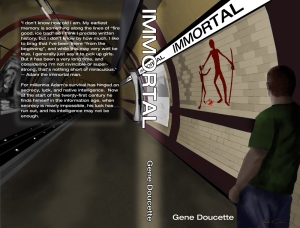On agents
I ended up in a Twitter chat last night for anyone interested in asking a literary agent a question, and I realized… I didn’t have any questions.
Well, that’s not true, I had two: “would you like to represent me” and, “how about now?” But those are rude questions, because I have to think there aren’t a lot of agents out there picking up people they just met on Twitter.
My first agent
Besides which, I have a bit of a history when it comes to agents. My first agent picked up a novel of mine called Charlatan, and managed to not sell it over the course of two years. In fairness, I can admit now that the book didn’t deserve to be sold. (Although the plot was solid, and the basis of an award-winning screenplay. And yes I love saying that.) But that doesn’t mean he was the Best Agent Ever, either. Just to drive that point home: I sent him a copy of my non-fiction humor book, Beating Up Daddy, and later found him selling it on Amazon. Yes, really.
My second agent
My second agent was much better. He fell in love with Immortal almost before he finished reading it, and rushed a contract over without ever stopping to consider the best way to sell it.
Problem? Yes. Immortal is sort of a genre-buster, fitting in neither sci-fi nor fantasy– or rather, both sci-fi AND fantasy– which was a major concern. A science fiction novel that looks at the past instead of the future? With vampires? That’s fantasy. A fantasy with no magic? That’s sci-fi. If there was a bookshelf nailed between the two genres, the book would fit there. But in 2004, there was no such shelf. (Since then it seems the market has come to Immortal more than Immortal has come to the market.)
But that was only one problem. The other was that he advised me to take a few months and rewrite the last third of the book.

Always do the rewrite
What I did instead was took a few weeks and retooled some of the elements of the ending, but nothing like the full-out rewrite it really needed. This was entirely on me, and so if you take nothing else away from this blog post, take this: if someone tells you to do an extensive rewrite, do the damn rewrite.
So the book was sent out to a dozen major publishers, and the notes kept coming back the same: “we love this, the writer is clearly very talented, we don’t know how to sell it, good luck” and the occasional “the ending is a little weak.”
In desperation, I finally blew up the ending and did the extensive rewrite I should have done earlier, but nobody was going to look at it a second time. And after two years we were out of major publishers.
Meanwhile, I wrote another novel, Fixer, which was more traditionally science fiction, although set in the present. Fixer is about a guy who can see 3-5 seconds in the future trying to stop a being who lives five seconds in the future from killing people. (More or less.) It was, I felt, much more sellable than Immortal, and so when it was done I dutifully sent it to my agent.
He did not agree. “We feel this will be as difficult to sell as Immortal,” he said. (He had also, not at all coincidentally, jumped to a different agency in the interim, and this agency didn’t routinely handle SF/F.) And since he’d run out of places to send Immortal, he dropped me.
Why I don’t have an agent now
Um… no reason.
Actually, what happened after that was I began writing screenplays, which is a story unto itself. Also, I found a publisher for Immortal on my own. (Technically, I found two publishers, but that is also a story unto itself.) Fixer remains un-marketed and will probably remain so until Immortal is published, which is the sort of thing that will only look good on a resume.
Besides, what I really need is an agent that can handle All Of The Above: an award-winning thriller screenplay, a SF/F novel or three (Immortal has two sequels, one of which is already written) and so on. And that’s not an easy combination to come by.


[…] This post was mentioned on Twitter by Gene Doucette, Gene Doucette. Gene Doucette said: NEW BLOG POST: On Agents– http://wp.me/pXlXL-z […]